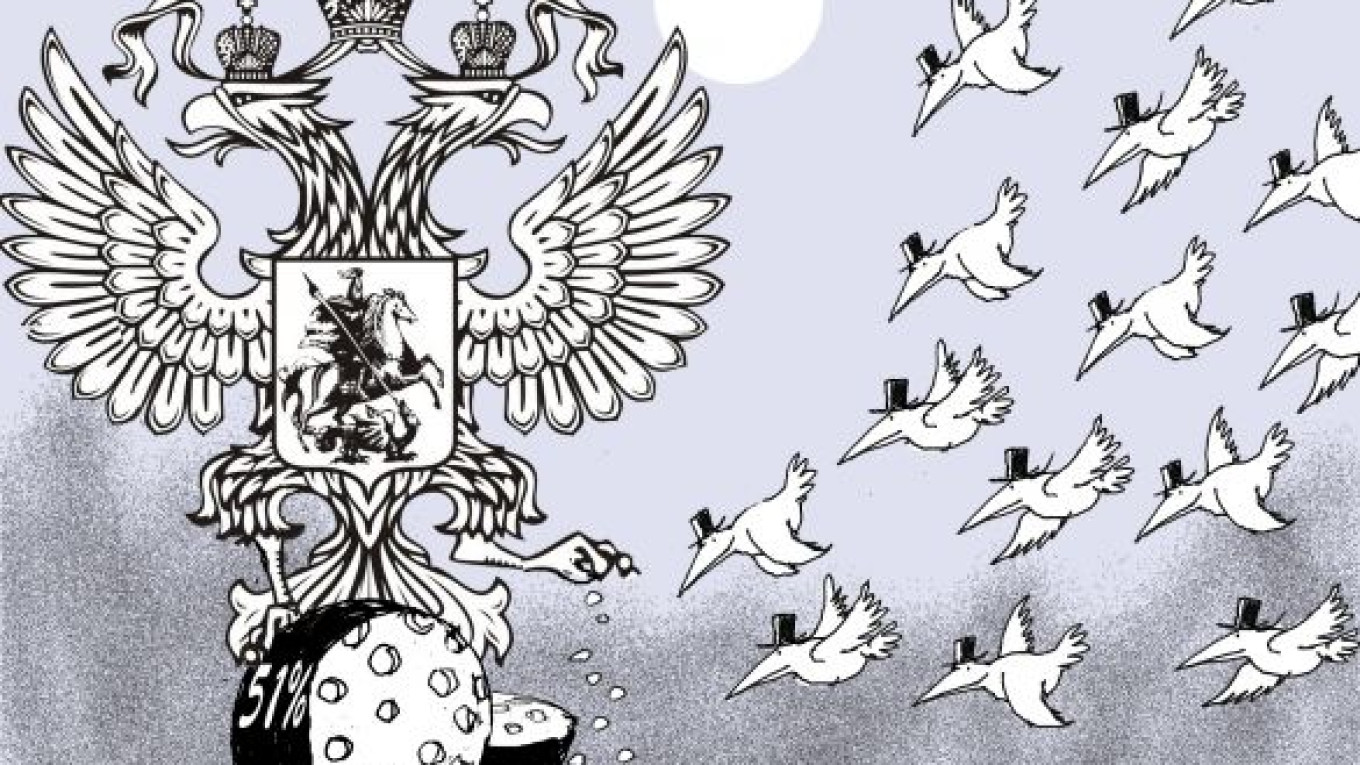It’s easy to dismiss Russia’s privatization plan for 2011-13 — in which stakes in 11 state-controlled firms are to be sold to raise as much as $29 billion — as a public relations snow job that will benefit only a small cabal of insiders. But there is a chance that this time it may turn out better than expected.
Critics of the plan have some powerful arguments. First, the plan isn’t really a “privatization” at all. Control will not pass from state to private hands. The government will maintain at least a controlling 51 percent stake in every state-controlled company in which a stake is to be sold, including oil champion Rosneft, Sberbank, VTB, pipeline monopoly Transneft and hydroelectric utility RusHydro. In practice, this means that the government will continue to have the biggest say in installing management, dictating corporate strategy and controlling cash flows.
As such, as preliminarily outlined, the program does not represent a fundamental change in the government’s overarching objective of maintaining control over key assets in the economy. In fact, if anything, other recent developments suggest that the state is focused on consolidating its control over specific key sectors of the economy, rather than on reducing state involvement in the economy per se. For example, recent indications suggest the creation of a fertilizer national champion is under way, which would result in heightened government control over the sector. Also, reports suggest that the government may be contemplating the purchase of a stake in Norilsk Nickel, partly to lay the groundwork for the development of a national champion in the metals sector.
More broadly, privatization is a dirty word for many Russians, as it evokes the infamous loans-for-shares deals in the mid-1990s that laid the foundation for Kremlin-friendly oligarchs to gorge on the country’s crown jewels. This time around, many question whether the Kremlin has the political will or desire to arrange sell-offs that are genuinely fair and transparent and will benefit the budget rather than Kremlin insiders. Whether foreigners will be allowed to participate in the partial privatization of these 11 state companies on equal footing remains an important open question, notwithstanding the recent pledge from Economic Development Minister Elvira Nabiullina that the terms and conditions will be equal for Russians and foreigners.
But even if the program won’t change the Kremlin’s fundamental position that the government should play a central role in the economy, a sell-off of significant state stakes in the country’s leading companies could nevertheless bring about real and positive change in the investment climate.
First, there will be a substantially stronger contingent of minority shareholders in a much larger number of state-controlled firms. Corporate governance standards in Russian companies are generally poor but have been slowly improving. A larger — and thus stronger — class of minority shareholders among Russian blue chips may generate sufficient momentum to produce material and permanent improvement. With time, minority shareholders may be able to force these companies to become more transparent, which could have a ripple effect among other companies.
In recent years, there has been meager progress in addressing the structural challenges of corruption, weak rule of law and political risk that define Russia’s investment environment. But with a genuine financial incentive and a concrete deadline to improve the country’s investment environment, the government could finally discover the will to make progress in addressing the issues that contribute to the valuation discount of Russian assets compared with those of other emerging markets. The Kremlin must understand that bona fide change could result in a positive re-rating of Russian market valuations. This, in turn, could result in billions of dollars of incremental revenue in privatization sales. It could also trigger sharp growth in foreign direct investment, give hope to the Kremlin’s aspirations of turning Moscow into an international financial center and have a host of other positive knock-on effects.
In recent months, the government has elevated its rhetoric about improving the country’s investment environment. The challenge now will be to follow through to show that its objective is more than just changing perceptions but altering the real business climate. One good start would be the obvious low-hanging fruit of effectively easing the visa regime for foreigners interested in investing in the Russian economy.
A transparent, nondiscriminatory and fair sale of state assets would be a critical achievement and a sign that Russia is truly serious about improving its investment environment. History is not particularly encouraging when assessing whether this time things will be different. But a number of pieces may be falling into place.
Kim Iskyan is a director at Eurasia Group, a global political risk consulting firm, and is based in Washington.
A Message from The Moscow Times:
Dear readers,
We are facing unprecedented challenges. Russia's Prosecutor General's Office has designated The Moscow Times as an "undesirable" organization, criminalizing our work and putting our staff at risk of prosecution. This follows our earlier unjust labeling as a "foreign agent."
These actions are direct attempts to silence independent journalism in Russia. The authorities claim our work "discredits the decisions of the Russian leadership." We see things differently: we strive to provide accurate, unbiased reporting on Russia.
We, the journalists of The Moscow Times, refuse to be silenced. But to continue our work, we need your help.
Your support, no matter how small, makes a world of difference. If you can, please support us monthly starting from just $2. It's quick to set up, and every contribution makes a significant impact.
By supporting The Moscow Times, you're defending open, independent journalism in the face of repression. Thank you for standing with us.
Remind me later.


